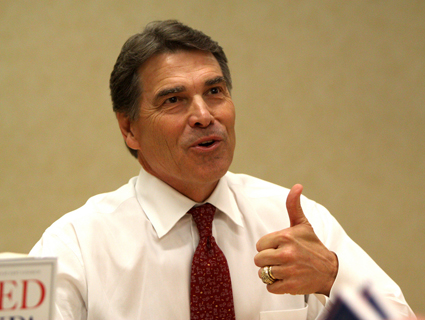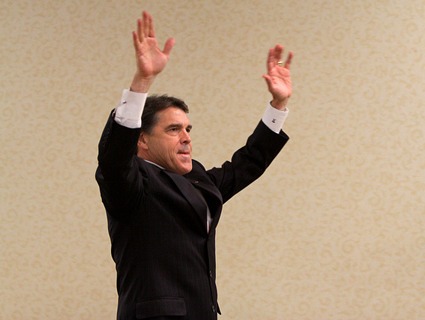
Texas Gov. Rick Perry.<a href="http://www.flickr.com/photos/gageskidmore/5855364704/sizes/l/in/photostream/">Gage Skidmore</a>/Flickr
Wednesday night at the Republican debate, Texas Governor Rick Perry turned the possibility that Texas had executed an innocent man during his tenure into an applause line.
The problem lies, in part, with the phrasing of the question. Rather than asking specifically about the circumstances of the execution of Cameron Todd Willingham, who was convicted of setting a fire that killed his three children, Moderator Brian Williams offered a more abstract query about innocence and the death penalty.
WILLIAMS: Governor Perry, a question about Texas. Your state has executed 234 death row inmates, more than any other governor in modern times. Have you…
(APPLAUSE)
Have you struggled to sleep at night with the idea that any one of those might have been innocent?
PERRY: No, sir. I’ve never struggled with that at all. The state of Texas has a very thoughtful, a very clear process in place of which — when someone commits the most heinous of crimes against our citizens, they get a fair hearing, they go through an appellate process, they go up to the Supreme Court of the United States, if that’s required.
But in the state of Texas, if you come into our state and you kill one of our children, you kill a police officer, you’re involved with another crime and you kill one of our citizens, you will face the ultimate justice in the state of Texas, and that is, you will be executed.
WILLIAMS: What do you make of…
(APPLAUSE)
What do you make of that dynamic that just happened here, the mention of the execution of 234 people drew applause?
PERRY: I think Americans understand justice. I think Americans are clearly, in the vast majority of — of cases, supportive of capital punishment. When you have committed heinous crimes against our citizens — and it’s a state-by-state issue, but in the state of Texas, our citizens have made that decision, and they made it clear, and they don’t want you to commit those crimes against our citizens. And if you do, you will face the ultimate justice.
This was a slow, fat pitch right down the middle. Asked in the abstract about the death penalty and the possibility of innocents being killed by accident, Perry essentially said that once the convicted have exhausted their legal options, they have to face the punishment they’ve been handed down. Oppose execution at that point, and you’re just a hippie or a conspiracy theorist.
But the death penalty in the abstract is easy to defend in an American political context. What’s far more difficult to defend is Perry’s specific conduct in the Willingham case. As David Grann wrote in the New Yorker, prior to Willingham’s execution, a witness who said Willingham had confessed to the crime recanted. The testimony of arson experts was exposed as being based on “junk science.” The Texas Board of Pardons and Paroles refused Willingham’s requests for clemency, and he was executed in 2004.
As my colleague Tim Murphy pointed out Wednesday night, it’s what happens next that calls Perry’s conduct into question. In 2009, as the Texas Forensic Science Commission was investigating the Willingham case. Perry, in the midst of a primary battle with former Texas Senator Kay Bailey Hutchinson, replaced the chair of the commission with a political ally who significantly slowed down the investigation.
The issue here is not just that sometimes the system makes mistakes, mistakes which the death penalty makes irreversible. It’s that faced with the possibility that the system executed an innocent man, Rick Perry went out of his way to stifle the investigation because it might have made him look bad. It’s hard to think of a worse form of government abuse than wrongly depriving someone of life. Yet faced with the possibility that Texas had done just that, small government conservative Rick Perry did his best to ensure no one would ever know for sure.
You don’t have to oppose the death penalty to find it alarming when politicians display a reckless disregard for making sure it’s properly applied. Ta-Nehisi Coates described Texas as “a state that does not so much tinker with the machinery of death as it gleefully fumbles at the controls.” The machinery of death at the president’s disposal is far more lethal, and Perry’s fumbling at the controls in Texas raises obvious questions about how he’d act as president, when the stakes are much higher. After all, under some circumstances, the president doesn’t even need a trial to sentence someone to death. And when the president makes mistakes, the executive branch has considerably more power to cover them up.














